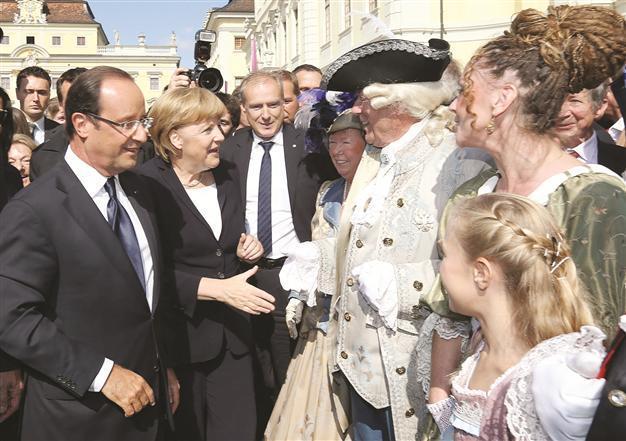Hollande insists ‘earlier the better’ of EU banking union
ASBERG, Germany - Agence France-Presse

French President Francois Hollande (L) and German Chancellor Angela Merkel (R) talk to costumed people in baroque outfits during a ceremony in Ludwigsburg, Germany.
French President François Hollande has insisted that speed was key in setting up a system of European banking surveillance, despite objections from Germany.
“I support a banking union, it is an important measure and we must proceed step-by-step,” Hollande said on Sept. 22 after talks with German Chancellor Angela Merkel, stressing such a framework should be in place “the earlier the better.”
Merkel, for her part, said Berlin also backed European oversight of lenders but urged a cautious approach. “For me it is important that quality is ensured. It is pointless to do something very quickly that in the end doesn’t work,” she said.
“It must be thorough, it must be of good quality and then we’ll see how long it takes. We will get our finance ministers to work with each other on it as quickly as possible.”
Power to ECBEU leaders agreed the new bank supervision system in June as part of a deal to allow the bloc’s rescue funds to directly lend to stricken banks instead of passing aid through countries and so adding to their debt woes.
Under the plan, the European Central Bank will assume “strong powers ... for the supervision of all banks in the euro area, with a mechanism for non-euro countries to join on a voluntary basis,” according to an EU statement.
It is a first step towards a banking union and dovetails with moves towards the deeper economic and political integration needed to tame the debt crisis which has brought the eurozone economy to a standstill.
The proposal has driven a wedge between Germany and France.
While France would like to hand the ECB power to supervise all 6,000 eurozone banks from January, Germany would like it to keep an eye just on big banks and is in little hurry. The proposal would also sideline the London-based European Banking Authority which was set up in the wake of the 2008 global financial crisis.
It has been opposed by among others Britain, home to the financial centre of the City of London where big eurozone banks have major interests.
